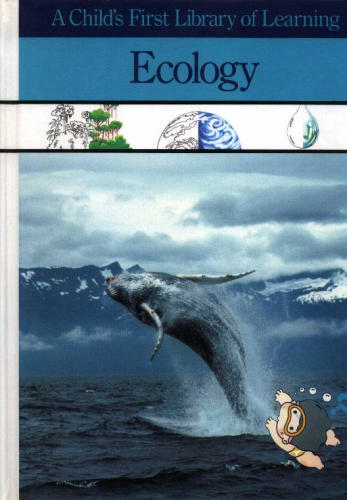-
Ecology
Susan H. Gray
Paperback (Children's Press, Jan. 11, 2012)Discover how ecologists study the relationships between living things, climates, and Earth itself.A True Book: Earth Science series presents fascinating facts and fun activities that will engage the budding earth scientist, while exploring the fields of geology, meteorology, ecology, and more. This series includes an age appropriate (grades 3-5) introduction to curriculum-relevant subjects and a robust resource section that encourages independent study. Our planet is a complicated place. Millions upon millions of living things all depend on one another to form a complex web of life. R
R
-
Urban Ecology
Jennifer Cochrane
Library Binding (Franklin Watts, March 1, 1988)Alternates factual information on the ecological aspects of an urban environment with activities and experiments, covering such areas as city water, parks and ponds, wild mammals in town, and trash.
-
Ecology
George S. Alexander, Taylor R.; Fichter
Paperback (Golden Press, March 15, 1973)Ecology, a Golden Science Guide, gives a general approach to the ecology and demonstrates how man and all other living things relate to their environment in a complex system of checks and balances between the earth's living and non-living components. Only by understanding these principles can man achieve and maintain the environmental quality considered desirable or acceptable. Illustrated in full color photographs.
-
Ecology
Stanley I. Dodson, Timothy F. H. Allen, Stephen R. Carpenter, Anthony R. Ives, Robert L. Jeanne, James F. Kitchell, Nancy E. Langston, Monica G. Turner
Hardcover (Oxford University Press, March 26, 1998)Complex and diverse, modern ecology is often difficult to introduce to undergraduate students in a way that conveys the excitement and enthusiasm that ecologists feel for their field. In this text, the authors aim to encourage students by adopting a new approach to teaching modern ecology, dividing the field into several distinct subdisciplines, each with its own way of looking at the world... Unique and accessible, Ecology concentrates on the ideas and techniques that separate different concept-based approaches to the study of ecology. It discusses six kinds of ecology: landscape, physiological, ecosystem, population, community, and behavioral, focusing on the kinds of questions ecologists ask about their world rather than on accumulated ecological knowledge. For each type of ecology, the authors explore how it is distinct, the theory and technology involved, and its successes and possibilities for the future. Each chapter discusses the roles of evolution and of modeling in that particular kind of ecology, and also emphasizes that there are important questions ecologists do not yet have the answers to. These questions encourage students to consider pursuing the study of ecology because there is still much significant work to be done. The authors, all experts in specific areas of ecology, strive to inspire students by communicating the excitement they feel about their respective fields of study and by actively involving students in the learning process. The discussions are set in the context of the human relationship to nature and include practical applications of ecology, such as resource management and conservation. Easily accessible to undergraduate students in general ecology, this brief, up-to-date, and lucidly written text is an ideal starting place for learning ecology. It sets ecology in its cultural context and encourages students to see ecology happening all around them, opening their eyes to the wide range of possibilities in the field and providing them with a firm basis for further reading and for choosing advanced courses and careers. The text will soon be enhanced by helpful supplemental material: the authors are currently in the process of developing a website (which will include the art from the book, lab and field experiments, data sets, and sample tests) and a book of readings to accompany the text.
-
Ecology
Peter Rillero, Dinah Zike, National Geographic Society (U. S.)
Hardcover (Glencoe/McGraw-Hill School Pub, April 1, 2002)None
-
Ecology
R. Sourgeon
Paperback (Usborne Pub Ltd, June 1, 1988)A practical introduciton to ecology for 10-16 year olds, Ecology balances scientific information with hands-on practical activities, experiemnts and projects. The book also looks at the latest up-to-date scientific developments and tackles the environmental problems that accompany them. Z
Z
-
Ecology
Stephen Pollock
Hardcover (Dorling Kindersley Publishers Ltd, Sept. 30, 1993)None
-
Ecology
Donna Latham, Adam Miller, Maurizio De Angelis, Ian Escott, Gary Joynes
Paperback (Raintree, June 14, 2009)Have you ever wondered if the plants and animals in an area are somehow connected, or if they rely on each other to stay alive? 'Ecology' explores the complex relationships that allow all ecosystems to run smoothly. What happens when two species compete for the same food source? How do ecosystems deal with violent changes like erupting volcanoes and tsunamis? Read this book to find out! Sci-Hi is an engaging, comprehensive, and visually stimulating series that takes learning science core curriculum to a whole new level.
-
ECOLOGY
Rebecca Stark
Paperback (Educational Impressions, )None
-
Ecology
Peter Farb
Hardcover (Time-Life Books, Jan. 1, 1970)science book

